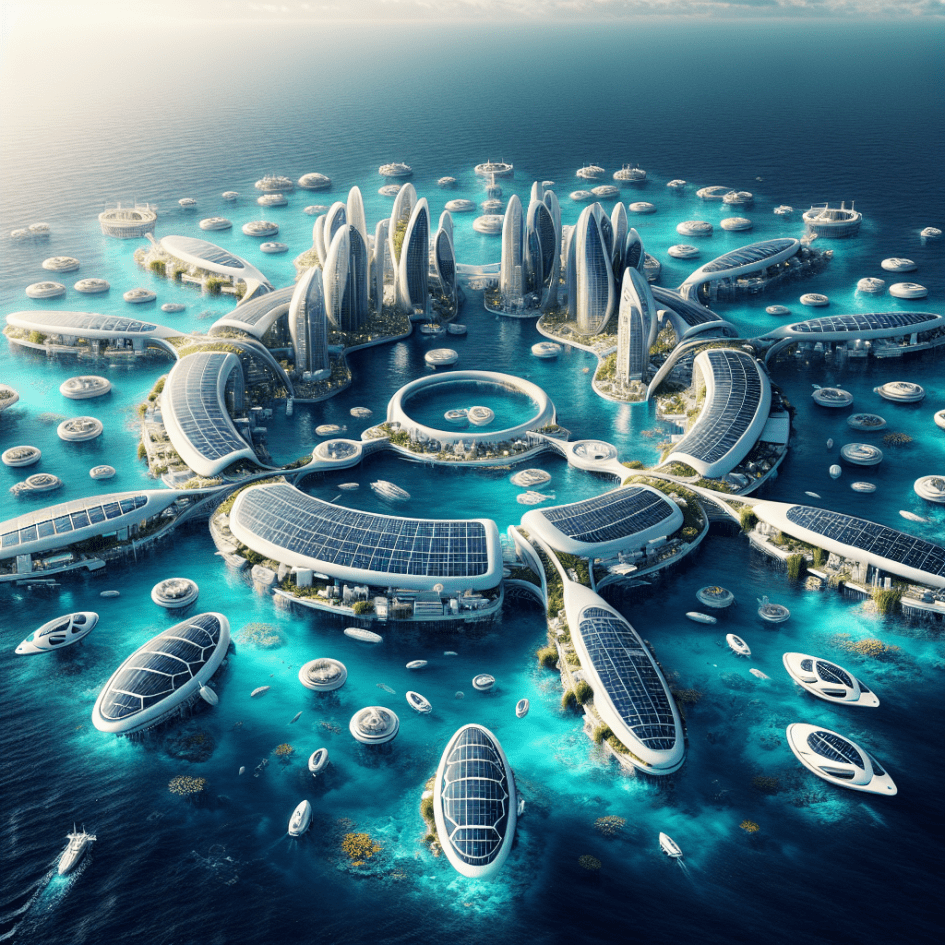The World’s First Floating City: A Futuristic Oasis or Environmental Disaster?
Ever thought about a city that floats serenely on water, a futuristic marvel or a catastrophic environmental faux pas? Join us as we dive into the world of floating cities, exploring their potential as futuristic oases and weighing the environmental stakes. Will these idyllic utopias become a paradise or a peril for our planet? Let’s find out!
What is a Floating City?
Imagine a metropolis that’s neither on land nor in the air, but gently drifting above the surface of the ocean. These floating cities are composed of interconnected, buoyant platforms that host everything from homes and offices to parks and shopping centers. And no, this isn’t the setting for the next sci-fi blockbuster – it’s quickly becoming a reality.
The Hype: A Futuristic Oasis
The allure of floating cities is undeniable, promising cutting-edge solutions to some of the world’s most pressing urban challenges. Here’s why these buoyant settlements are being hailed as futuristic oases:
- Space Saving: They unlock vast expanses of ocean for development, easing the burden on overcrowded coastal cities.
- Climate Resilience: Built to withstand rising sea levels, these cities offer a haven for populations displaced by climate change.
- Innovative Design: With designs inspired by nature and top technology, these metropolises are engineered for efficiency and sustainability.
- Renewable Resources: Harnessing wind, solar, and wave energy, floating cities aim to be self-sufficient and minimize environmental footprints.
These grand visions make floating cities sound like the ideal solution for our burgeoning population and shrinking land resources. But hold on – it’s not all smooth sailing.
The Concerns: Environmental Disaster?
Like every coin, floating cities have a less shiny flip side. Environmentalists warn that these projects could spell ecological calamity. Here’s what keeps them up at night:
- Marine Ecosystem Disruption: Anchoring large platforms and constructions into the ocean can disturb fragile marine habitats.
- Waste Management Challenges: Efficiently handling human waste and preventing ocean pollution is a daunting task.
- Resource Extraction: Construction materials and energy needs might lead to over-exploitation of natural resources.
- Inequality: These high-tech habitats might become exclusive enclaves for the wealthy, exacerbating social and economic divides.
Addressing these concerns is crucial for ensuring that floating cities live up to their utopian promise without becoming environmental disasters.
Real-World Examples: Where are We Now?
So, are floating cities just a figment of our collective imagination, or are we actively setting sail towards them? Here are some real-world projects making waves:
Seasteading Institute
The Seasteading Institute, a pioneer in this field, aims to establish autonomous, mobile societies on international waters. Their pilot project in French Polynesia is eagerly watched by both proponents and skeptics.
Oceanix City
Oceanix City, unveiled at a United Nations roundtable, proposes modular floating neighborhoods. Each module can house up to 300 residents, with designs focusing on sustainability and resilience against natural disasters.
Floating Amsterdam
The Dutch are already sailing ahead with Amsterdam’s floating neighborhood – Schoonschip. This eco-friendly community showcases solar energy, green roofs and innovative water management solutions.
The Verdict: Oasis or Disaster?
The concept of floating cities straddles the line between futuristic oasis and potential environmental debacle. With thoughtful planning, sustainable practices, and an eye on egalitarian principles, these buoyant metropolises could indeed offer innovative solutions to the challenges faced by traditional cities.
However, vigilance is paramount. Scrutinizing every aspect – from environmental impact assessments to socio-economic implications – will determine whether these floating dreams become a beacon of progress or a cautionary tale.
In the end, the success of floating cities will hinge on our collective responsibility and innovation. It’s a tide we must navigate carefully, balancing our ambitions with the planet’s welfare. Let’s hope we sail this ship right!
So, what do you think – a futuristic oasis or an environmental disaster? Drop your thoughts in the comments below and join the conversation!
